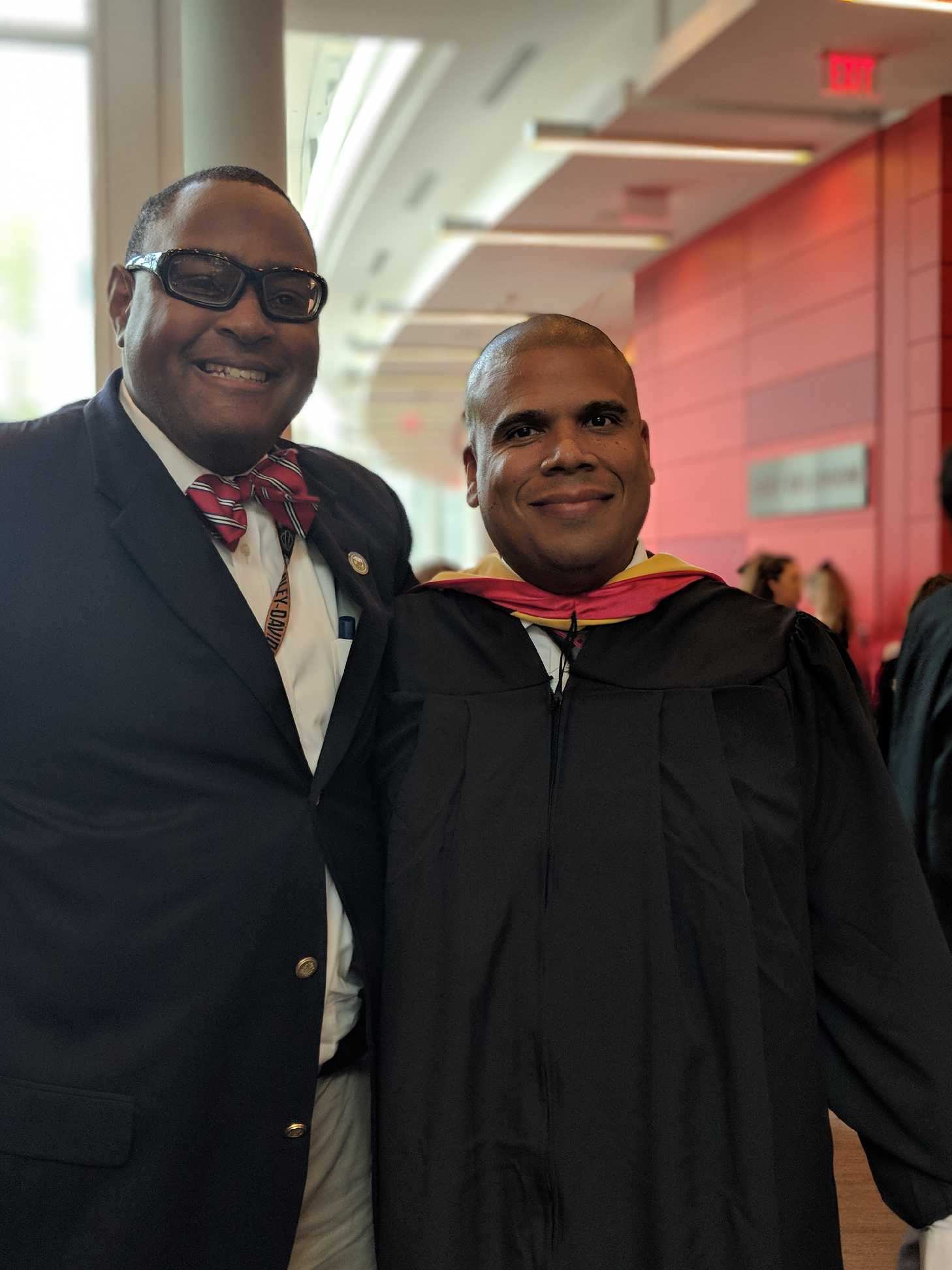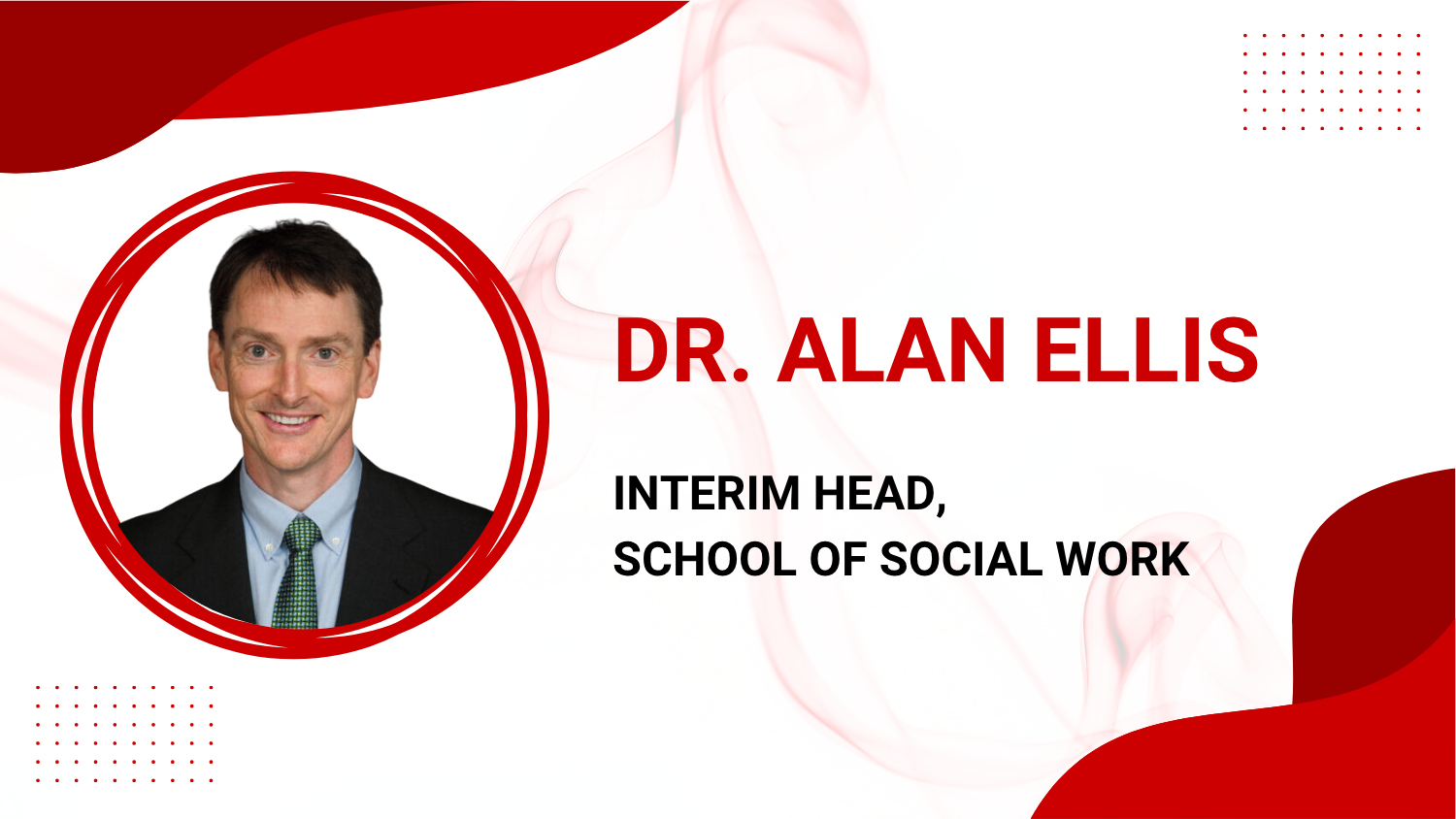2018 MSW Graduate, Ron Scott, Making a Difference in the Drug Recovery Court

Above – Judge Craig Croom (left) with Ron Scott (right) at graduation.
Ronald (Ron) Scott, now 43, decided to take the leap of faith and return to school to pursue his Masters in Social Work (MSW) two years ago. For many working professionals and parents, the idea of returning to school to pursue a graduate degree is an intimidating prospect. After being out of school for several years, the idea of sacrificing the security of the traditional 9-5 schedule, as well as being back in a classroom, can be a deterrent that prevents social work practitioners from furthering their education, even if doing so is necessary for many to obtain advancement opportunities. Scott decided the opportunity was worth the challenge.
Like many MSW students, Scott discovered his passion for social work later in his career. “I grew up in Cary, NC where both [my] parents were professionals. [My] mother is a retired teacher of the Wake co school system, my father was a Special Agent for NCIS [Naval Criminal Investigative Service] and US Postal Service. Growing up, I knew I wanted to be in law enforcement like my father. I received my BA in Criminal Justice from UNC-Pembroke in 1997, but [after] I finished my undergraduate [degree], I realized that law enforcement was not my career path” Scott says of his childhood and education. Social Work, unlike other majors, sees an influx of students from other disciplines, both in the BSW (Bachelor of Social Work) and MSW programs. “Incoming social work students usually find social work later in their academic career, as many do not understand what social workers actually do. Many do enter into the field as traditional first-year students, do so because they have had an experience with a social worker in the past, knew a social worker growing up or were related to one” says Paige Moore, Academic Advising Coordinator for the Department of Social Work.
At first after graduating from UNC-Pembroke, Scott “worked for NC Administrative Office of the Courts (AOC) as a Business Systems Analyst, developing and training courthouse personnel throughout NC on systems that enhanced productivity in the Judicial System.” It was there where he found his passion for social work, “while working for AOC and traveling [across] the state [of North Carolina] to different courthouses, I realized that the majority of criminal cases being processed were drug related. In 2002, I made a leap of faith and changed my career path that would still use my criminal justice degree, but in a way to help people trapped in the revolving door of the legal system.”
Though his position with AOC was a step in the right direction, Scott still found that he felt unfulfilled with his role. He decided “to make a career change [where I could] use my criminal justice degree to help individuals get ‘out’ of the legal system instead of [being] incarcerated. In 2002, I began my career as a substance-use counselor within the criminal justice system as a TASC (Treatment Accountability to Safer Communities) Coordinator. From there, I began to help individuals get back on their feet by providing counseling and case management as these individuals work through the legal system.”
Scott continued to search for positions and certifications that he felt best aligned with his new career goals. “In 2006, I became certified as a Certified Criminal Justice Addiction Professional (CCJP). In 2007, I began my work as the TASC liaison to the Drug Treatment Court team in Wake County. I was already working with this population prior to Drug Court. Drug Court is a form of Offender Management Model that provides a participant in the program a network of services that guides that individual to a higher quality of life and reduce recidivism within the community. In 2008, I was offered the position as the Drug Treatment Court Coordinator as the program in Wake County expanded services in District 10” he says of his professional journey.
It wasn’t until fall 2015 that he decided to take another leap of faith and apply for the MSW Program at NC State after meeting NC State social work faculty members, “Dr. Bullock, Dr. Stansbury, and Dr. Fitzpatrick attended a Drug Court session in 2015 and persuaded me to enroll in the program,” Scott said of the meeting. At first, Scott, who is married to his supportive wife (Michelle Scott) and is also a father of four children (two of whom are minors still living at home) was hesitant about applying. He was concerned about his “age and becoming a full-time student” Scott recalls.
Eventually, he made the decision to apply. He was offered admission and began his MSW studies the following fall of 2016. “Coming to NC State was fun and adventurous. The staff in the social work program made me feel welcomed. Since I have experience in the work field, I had strong beliefs of the criminal justice system and the field of social work. As a MSW student I learned to grow as a social worker and reflect on the way I conducted business in the legal system” Scott says of coming to NC State.
As a non-traditional student returning to school as a working professional, Scott feels his experience at NC State was different from the experiences of many traditional students. “I would say my experience was different to most students in my cohort because of the years of experience I had in this field of work. I have witnessed the injustice the legal system can cause on marginalized groups. I also experienced the positive side of the legal system as I have been part of a small group of individuals that provide diversionary solutions to incarcerations,” he recalls. Additionally, Scott also encountered other challenges after returning to school. Since he remained employed while enrolled in the MSW program, he says that it was difficult “balancing family time with my wife and kids. Going to school full-time while working full-time was a challenge, especially when I had to go back and forth from work to school, and finally still coaching basketball several days a week and traveling to tournaments while still trying to get assignments completed.”
Now having recently graduated, Scott is still employed as the Drug Treatment Court Coordinator of Wake County. Though he has been in the position since 2008 and continued to remain employed there throughout graduate school, he can now use the knowledge he gained while in school to benefit his clients through the Drug Treatment Court, which Scott says serves to “support these individuals [through] case management, substance-use and mental health treatment, peer-support, and any other psycho-social needs”.“As a Recovery Court Coordinator, my job entails managing the entire Recovery Court program. I assess potential new participants for the program, case manage all participants and make sure their needs are met throughout the duration of the program. I also manage staff meetings and conduct court hearings,” Scott says of his position. He adds that “[I find] enjoyment in my position [from] simply helping people in their journey to recovery. When an individual graduates from Recovery Court and I see the transformation they did from the time they walk into the time they leave, I know that my work was not in vain.”
Though he is a seasoned professional, it is still not always easy. “For the past 10 years, I have been with Drug Treatment Court/Recovery Court, I have seen the rise of opioid use overload the court system with the criminalization of substance-use…The biggest challenges currently are the opioid crisis and the legal system. The current state of the opioid epidemic has made it hard for individuals to kick the opioid habit. Opioid use is destroying lives, families, and the community. The legal system in NC has made it difficult for diversionary programs like Drug Courts to be successful in providing care for substance-use offenders. Laws in NC need to change to make access to treatment easier and funding for treatment needs to be a priority,” Scott says. Additionally, Scott says that “a criminal record can have its challenges on individuals in Recovery Court. The individuals I help have criminal records that can prevent them from gaining employment and/or housing.”
Scott, with his many years of experience working with individuals struggling with addiction, has some advice for how someone can help a friend who is in recovery: “If a friend is in need of help with addiction, I would say be a good friend. People who want to help those in recovery need to be passionate and have empathy to those who are facing this disease. Substance-use, unlike other diseases comes with a nasty stigmatization that people who use substances are ‘bad’ people and they can easily fix their infliction with just ‘quitting.’ Substance-use is like any other disease, it needs to be diagnosed, treated, and stabilized by maintaining a healthy lifestyle.Understand that being compassionate and having empathy will help your friend. Don’t judge and berate your friend. Guide them to options that can help them get through this terrible disease.”
- Categories:


